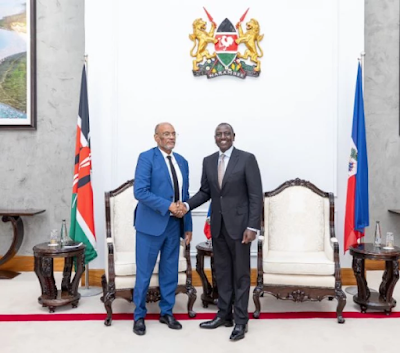Search This Blog
"Truth comes only to conquer those who have lost the art of receiving it as a friend." ~ Ravi Thakur
Featured
- Get link
- X
- Other Apps
As Barbecue Besieges Haiti's Capital, Prime Minister Henry Is Nowhere to Be Found
The whereabouts of Haiti's Prime Minister Ariel Henry have plunged into uncertainty following his recent diplomatic endeavour in Kenya.
Henry, who signed a bilateral agreement with Kenyan President William Ruto aimed at orchestrating a multinational force to tackle Haiti's security crisis, has not been traced for three days since the signing.
Meanwhile, Haiti, grappling with entrenched gang violence and political instability, declared a 72-hour state of emergency after a brutal clash erupted between law enforcement and powerful armed gangs over the weekend.
The chaos ensued amidst mounting pressure on Henry, with gang leader Barbecue vocally advocating for Henry's removal from power.
Henry's overseas diplomatic mission sought to garner support for an international security intervention to address Haiti's dire security situation.
The bilateral pact signed in Kenya aimed to facilitate the deployment of a contingent of Kenyan police officers to lead a proposed multinational, UN-backed force in Haiti. President Ruto emphasised the urgency of the mission, highlighting its humanitarian imperative.
However, the legality of the accord faces scrutiny, as a recent Kenyan court ruling deemed such a deployment unconstitutional.
Constitutional lawyer Ekuru Aukot also denounced Henry's capacity to commit Haiti to the treaty, branding the signing misleading and asserting that Henry lacked popular legitimacy and mandate.
As Haiti reels from the aftermath of the weekend's violent confrontations and mass prison breakouts orchestrated by Barbecue's gang alliance, Prime Minister Henry's absence exacerbates the prevailing uncertainty and instability. The government's imposition of a state of emergency and evening curfew underscores the gravity of the situation, with Acting Prime Minister Patrick Boivert assuming interim leadership responsibilities.
Amidst escalating violence and political turmoil in Haiti, neighbouring countries have been prompted to reassess their security arrangements. The United States, urging its citizens to depart Haiti expeditiously, has expressed concern over the evolving crisis. In neighbouring Dominican Republic, efforts to bolster border security and military preparedness are underway, while other nations, including the Bahamas and Mexico, are contemplating withdrawing their diplomatic personnel until stability is restored.
Despite the chaos gripping Haiti, voices both domestically and internationally are advocating for Prime Minister Henry's return to assert leadership and address the unfolding crisis amidst reports of Barbecue's threats to prevent his return.
Against the backdrop of Haiti's state of emergency, attention now turns to figures from the nation's tumultuous political past. The role and influence of actors such as former coup leader Guy Philippe, amidst the current unrest, raise concerns about the nation's stability and prospects for resolution.
As Haiti grapples with escalating violence, political uncertainty, and the conspicuous absence of its prime minister, the nation's future hangs in the balance. The international community is closely monitoring developments and urging swift action to restore stability and alleviate the suffering of Haiti's beleaguered population.
- Get link
- X
- Other Apps
Popular Posts

The One On Why Uganda Produces Shitty Ads
- Get link
- X
- Other Apps

Of Australian Bogans Masquerading As Creatives In Nairobi Agencies
- Get link
- X
- Other Apps




Comments
Post a Comment